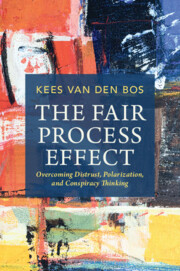Book contents
- The Fair Process Effect
- The Fair Process Effect
- Copyright page
- Contents
- Preface
- Acknowledgments
- Part I Introduction
- Part II Perceiving Procedural Fairness
- Part III The Fair Process Effect
- Part IV Examining Societal Discontent
- Chapter 6 Distrust
- Chapter 7 Polarization
- Chapter 8 Conspiracy Thinking
- Part V Overcoming Societal Discontent
- References
- Index
Chapter 6 - Distrust
from Part IV - Examining Societal Discontent
Published online by Cambridge University Press: 26 October 2023
- The Fair Process Effect
- The Fair Process Effect
- Copyright page
- Contents
- Preface
- Acknowledgments
- Part I Introduction
- Part II Perceiving Procedural Fairness
- Part III The Fair Process Effect
- Part IV Examining Societal Discontent
- Chapter 6 Distrust
- Chapter 7 Polarization
- Chapter 8 Conspiracy Thinking
- Part V Overcoming Societal Discontent
- References
- Index
Summary
Chapter 6 points out that people’s searching for information plays an important role in understanding different forms of distrust. People especially tend to be oriented toward what authorities think of them, in part because authorities have power over people and can exclude them from important groups or grant them permission to become full-fledged members of those groups. Furthermore, how institutions evaluate someone conveys important symbolic information whether they are viewed as a valuable member of society. In turn, when someone assesses or suspects that their views are not taken seriously into consideration, this increases the chances of distrust in the social institutions at hand, and the people representing those institutions. Processing information about what happens in society in an abstract way tends to facilitate the formation of distrusting attitudes. A central theme of this book is that fairness and justice are taking place where the individual meets the group. That is, whether your group (including your community and society) treats you in a fair way reflects how the group and important members of the group think of you. Experiencing concrete instances of unfair treatment has special significance and increases the chances of judgments of distrust to develop and flourish.
Keywords
Information
- Type
- Chapter
- Information
- The Fair Process EffectOvercoming Distrust, Polarization, and Conspiracy Thinking, pp. 67 - 79Publisher: Cambridge University PressPrint publication year: 2023
